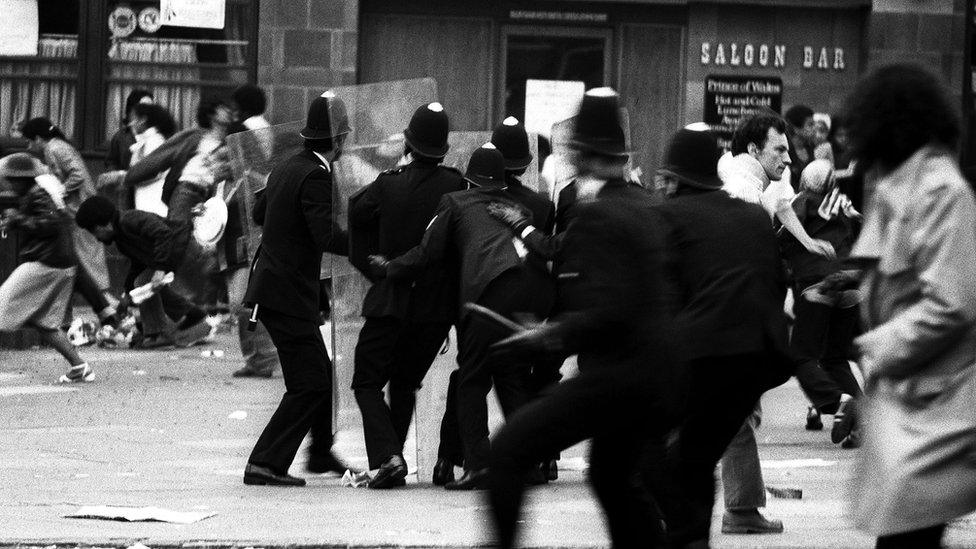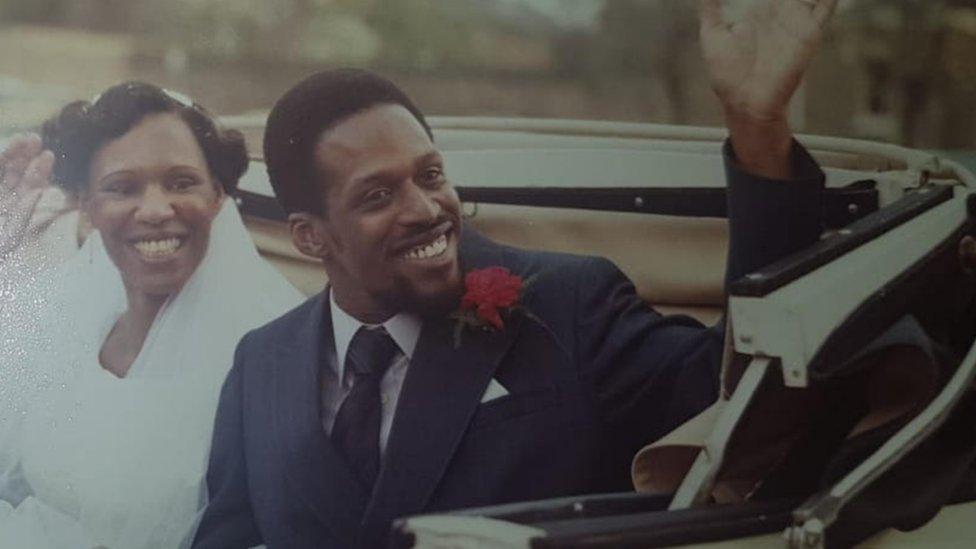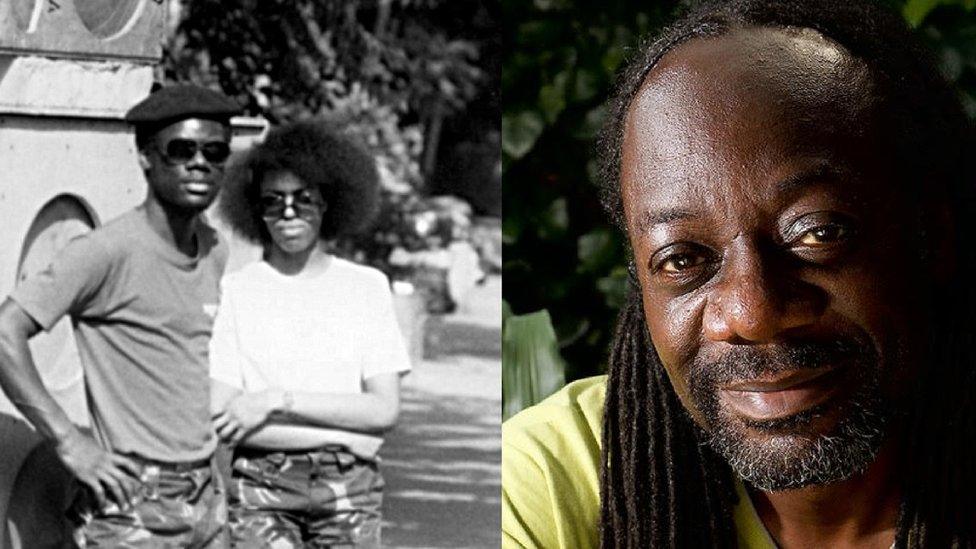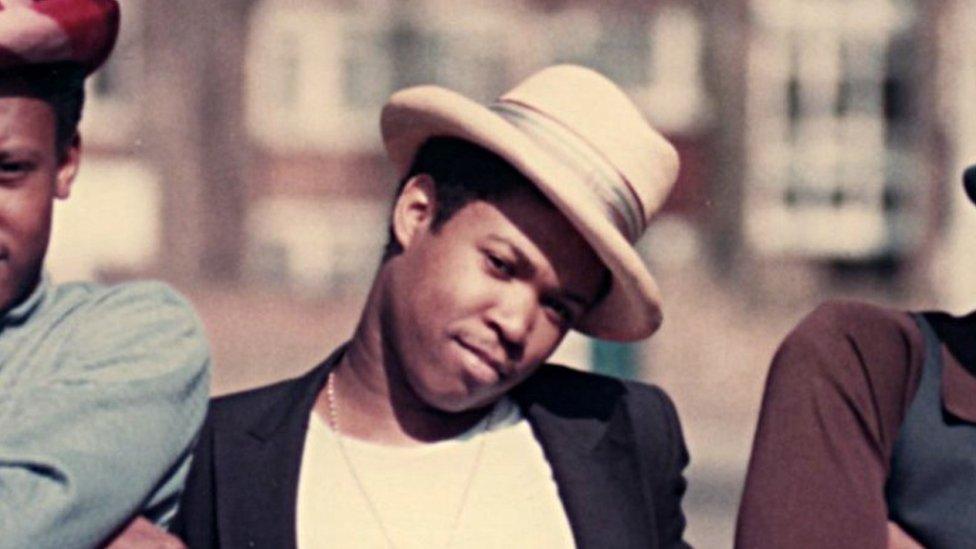Brixton riots: Has enough changed in 40 years?
- Published

"Society is now breaking out in the same way that we did - 40 years ago," explains Christopher Icha.
The Brixtonian was only 17 when his home area went up in flames on 10 April 1981.
He took part and saw it as taking a stand against the police.
Poor housing, unemployment, and police harassment were later said to have caused the disorder.
But 40 years on, has enough changed for the children of the riots?
The grime MC looks back at the Brixton riots and their impact on the community
'Utter devastation'
Community worker Olga Carnegie was supposed to be celebrating her wedding on the day of the riots.
While she did get married, instead of going to her wedding party, she and new husband David were picking their way through the rubble where they lived.
Three days of rioting left 279 police injured, some seriously, dozens of cars and buildings destroyed by fire, and caused £7.5m worth of damage.

Olga and David Carnegie's wedding party was cancelled because of the 1981 Brixton uprising
"We could see the utter devastation that had taken place," she said.
"The damage that was done to the shops and the mannequins that were strewn all over the streets.
"There's a quote, and I think it's Martin Luther King who said it, that 'riot is the language of the unheard'. And we had been unheard for a long time.
"We were thinking - 'is this our legacy now?'."
'Racial disadvantage'
Within society, the legacy was huge. And the voices of young black people like Olga were heard.
When, later that year, Lord Scarman published his report into the disturbances of 1981, he said the police "must carry some responsibility" for the outbreak of disorder.
He said "racial disadvantage was a fact of British life", and called for government action to improve housing, jobs and education for young people in riot-torn inner city areas.
The verdict sent shockwaves through the establishment.

Christopher Icha in the mid 1980s - and now
But for those on the front line - like Christopher - the legacy was not change, but stigma.
"Even years later, when I got a job as a production editor, one of the guys there found out that I was from Brixton. He bought a brick to work and put it on my desk. He said, 'you're from Brixton. Here you go, you know what to do with this'.
"It just made life worse for us. And if you didn't have a job, you weren't getting one."
Olga believes Lord Scarman did not go far enough to heal the wounds of years of over-policing in communities like Brixton.
"Even though he found that there were instances of discrimination and segregation, I don't think he went far enough to say that there was institutional racism in the police force, which we knew very well that there was."
It would be 18 years until the MacPherson report gave her the verdict she wanted.
"We had to wait until that killing of Stephen Lawrence before it was said that the police were institutionally racist."

Sheldon Thomas, who took part in the Brixton riots, pictured in 1982
Christopher's friend Sheldon Thomas also took his stand against police during the Brixton riots, aged just 16.
Now an expert on gang culture - he believes his generation paved the way for huge change.
"I often say to my children, 'if it wasn't for me, you couldn't walk the streets'.
"Many young black kids would be in a far worse position than they are in now, most definitely.
"This is why I say to people, 'We are the original Black Lives Matter'."
'This is the struggle'
Yet both Christopher and Sheldon are keen for their children to create their own destinies.
"I want them to know who they are, and I want them to focus on what it is that they want to do, like white parents, like Asian parents, like any other parents," Christopher says.
He adds that he rarely discusses the events of 1981 with his family.
"I don't want them to just focus on black issues or black struggles. I don't want that to be something that they feel they have to carry."
Yet all the children of that generation agree - Black Lives Matter is a necessary continuation of their generation's journey towards true racial equality.
"This is the struggle and this has always been the struggle," Christopher says.
"Society may feel different. It may have taken a step towards where we need to go. I don't know if maybe a step is enough.
"We don't call them riots - we call them uprisings."
For Olga, stop and search - a huge issue for her contemporaries - is still a challenge for many young people today, including her son.
BBC archive shows the aftermath of first day of rioting in Brixton
"Michael has been stopped by the police a few times, to the point where they would follow him home.
"If you think back from my experience where I've seen black boys just taken up off the streets and taken to the police station, I was just not having that for my son.
"It's changed. Society has changed. I don't hear anything about anybody's head being flushed down toilets. It's more subtle.
"But you still have the same sort of policing going on. For me, nothing has moved on as I had hoped it would.
"Because if it had, then we wouldn't need Black Lives Matter."
Racism 'not tolerated'
The Metropolitan Police says it is a completely different force to the one that policed Brixton 40 years ago.
Its commissioner, Cressida Dick, has been instrumental in, they say, "personally improving the response to racist crime in London and enhancing the service we give to London's black community".
She has very clearly stated she will not tolerate racism within the force.
But for Sheldon, who took to the streets 40 years ago, the need for Black Lives Matter today, is evidence that true equality is still a work in progress.
"What happened in 1981 needed to happen - but the inequality in society that existed in the 60s, the 70s, the 80s, the 90s still exists today," he says.
"That's the reason why we have to keep fighting every day."
Christopher adds: "The legacy is that the work is still there and still needs to be done, and we still need to move this thing forward.
"And black lives still have to be said to matter."
'Brixton: Flames on the Frontline' is a new eight-episode podcast from BBC Radio 5 Live launched on BBC Sounds on 9 April.
Related topics
- Published10 April 2011